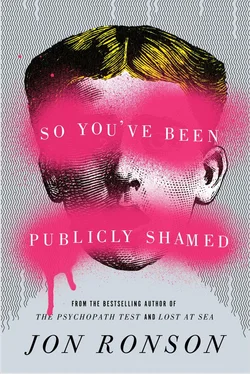Given all of this, you’d think LeBon’s work might have at some point stopped being influential. But it never did. I suppose one reason for his enduring success is that we tend to love nothing more than to declare other people insane. And there’s another explanation. One psychology experiment more than any other has kept his idea alive. It’s the one created in a basement at Stanford University in 1971 by the psychologist Philip Zimbardo.
• • •
Zimbardo was a working-class New York City boy, the son of Sicilian immigrants. After graduating from Brooklyn College in 1954, he taught psychology at Yale and NYU and Columbia before ending up at Stanford in 1971. Crowd theory — or “de-individuation” as it was by then known — preoccupied Zimbardo so deeply that in 1969 he wrote a kind of prose poem to it: “The ageless life force, the cycle of nature, the blood ties, the tribe, the female principle, the irrational, the impulsive, the anonymous chorus, the vengeful furies.”
Now, at Stanford, with funding from the U.S. Office of Naval Research, he set about trying to dramatically prove its existence.
—
Zimbardo began by placing a small ad in the local paper: “Male college students needed for psychological study of prison life. $15 per day for 1–2 weeks beginning August 14.”
After selecting twenty-four applicants, Zimbardo turned the windowless basement of the psychology department into a mock prison, with “cells” and a “solitary confinement room” (a janitor’s closet). He split the participants into two groups. Nine would be “prisoners,” nine “guards,” and the remaining six would be on call. He gave the guards batons and mirrored sunglasses so nobody could see their eyes. He gave himself the role of “superintendent.” The prisoners were stripped and put into smocks. Chains were placed on their feet. They were sent to their “cells.” And it began.
—
The experiment was abandoned six days later. It had, as Zimbardo later explained to a congressional hearing, spiraled violently out of control. Zimbardo’s fiancée, Christina Maslach, had visited the basement and was horrified by what she saw. The guards were strutting around sadistically, screaming at the prisoners to “fuck the floor” and so on. The prisoners were lying in their cells yelling, “I’m burning up inside, dontchya know? I’m all fucked-up inside!”
Maslach furiously confronted her fiancé: “What are you doing to these boys? You’re a stranger to me. The power of the situation has transformed you from the person I thought I knew to this person I don’t know.”
At this, Zimbardo felt like he’d been slapped awake. She was right. The experiment had turned him evil. “I have to end this,” he said to her.
—
“What we saw was frightening,” Zimbardo told the congressional hearing two months later. “In less than a week, human values were suspended and the ugliest, most base, pathological side of human nature surfaced. We were horrified because we saw boys treat other boys as if they were despicable animals, taking pleasure in cruelty.”
Zimbardo released a selection of clips from the footage he’d covertly filmed throughout the experiment. In them the guards were seen screaming at the prisoners: “What if I told you to get down on the floor and fuck the floor?” and “You’re smiling, [prisoner] 2093, you get down there and do ten push-ups,” and “You’re Frankenstein. You’re Mrs. Frankenstein. Walk like Frankenstein. Hug her. Tell her you love her.” And so on. As a result, and to this day, Zimbardo’s basement has become for students of social psychology the incarnation of LeBon’s crowd — a place of contagion where good people turned evil. As Zimbardo told the BBC in 2002, “We put good people in an evil place and we saw who won.”
—
But I couldn’t help thinking that the evil actions captured in Zimbardo’s covertly filmed footage looked a bit hammy. Plus, while I knew only too well how a psyche can be mangled by sleep deprivation (I have raised a teething and colicky baby) and by being forced into a windowless room (I once spent an ill-advised week in an inside cabin on the Mediterranean cruise ship MS Westerdam , and I’m sure I too would have repeatedly screamed “I’m all fucked-up inside” had it not been for my freedom to visit the Explorations Café and Vista Lounge whenever I liked), at no point, even on the worst nights, did I turn into someone from the Stanford Prison Experiment. What had really gone on in that basement?
• • •
Nowadays John Mark works as a medical coder for the health care company Kaiser Permanente. But for six days back in 1971 he was one of Zimbardo’s guards. Tracking down the participants hadn’t been an easy task — Zimbardo has never released all of their names — but John Mark has published letters about his memories of the experiment in the Stanford alumni magazine, which was how I discovered him.
“What happens when you tell people you were a guard in the Stanford Prison Experiment?” I asked him over the telephone.
“Everyone assumes I was brutal,” he replied. He sighed. “I hear it all the time. You turn on the TV and they’ll be talking about anything to do with brutality and they’ll drop in ‘as was shown in the Stanford Prison Experiment.’ They were studying it in my daughter’s high school. It really upsets me.”
“Why?” I asked.
“It’s not true ,” he said. “My days as a guard were pretty boring. I just sat around. I was on the day shift. I woke the prisoners up, brought them their meals. The vast majority of the time was just hanging out.” He paused. “If Zimbardo’s conclusion was the true conclusion, wouldn’t it have applied to all the guards?”
Then he said that if I looked closely at Zimbardo’s clips — he wished Zimbardo would release the full footage one day — I’d see that “the only guard who really seemed to lose his mind was Dave Eshelman.”
“Dave Eshelman?” I said.
—
He was right: When you picture the evil guards in Zimbardo’s basement, you’re really picturing one man — Dave Eshelman. He was the man who yelled “Fuck the floor!” and “You’re Frankenstein!” and so on. Social scientists have written papers analyzing Eshelman’s every move in there, including the strange detail that the more brutally he behaved, the more American South his accent sounded. I saw at least one analysis of the experiment where the author seemed to find it perfectly plausible that if a person was overcome by a violent madness he’d involuntarily start to sound like someone from Louisiana.
—
Nowadays Dave Eshelman runs a home-loan company in Saratoga, California. I telephoned him to ask how it felt to personify the evil that lies within all of us.
“I think I did a pretty damn good acting job,” he replied.
“What do you mean?” I said.
“This was not a simple case of taking an otherwise normal, well-balanced, rational human being, putting him in a bad situation, and suddenly he turns bad,” he said. “I faked it.”
He explained. The first night was boring. Everyone was just sitting around. “I thought, Someone is spending a lot of money to put this thing on and they’re not getting any results. So I thought I’d get some action going.”
He had just seen the Paul Newman prison movie Cool Hand Luke , in which a sadistic southern prison warden played by Strother Martin persecutes the inmates. So Dave decided to channel him. His sudden southern accent wasn’t some uncontrollable physical transformation — like when Natalie Portman sprouts feathers in Black Swan . He was consciously channeling Strother Martin.
“So you faked it to give Zimbardo a better study?” I asked.
Читать дальше












